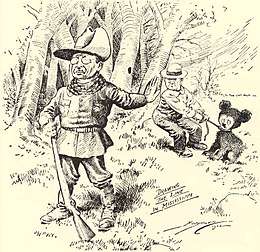Holt Collier
Holt Collier (c. 1848 – August 1, 1936) was a noted African-American Confederate scout, bear hunter and sportsman. While leading a hunt for U.S. President Teddy Roosevelt in November 1902, Collier unwittingly set the stage for the event that originated Roosevelt's nickname, "Teddy Bear."
Holt Collier | |
|---|---|
.jpg) Holt Collier at age 61, 1907 | |
| Born | c. 1848 Mississippi, USA |
| Died | August 1, 1936 Greenville, Mississippi |
| Nationality | American |
| Occupation | Soldier, hunter |
Biography[1]
Collier was born circa 1848 as a slave in Mississippi and was the third generation to serve the Hinds family on Plum Ridge Plantation, built by General Thomas Hinds, who was a veteran of the Battle of New Orleans in 1815. At the request of General Andrew Jackson, Hinds had surveyed central Mississippi and chose the site for the state capital, Jackson, before settling nearby in the area which is now Hinds County.
Collier killed his first bear at the age of ten; thereafter, his job was to supply meat for the table of the Hinds family and the field hands. With the outbreak of the American Civil War, Collier’s master Howell Hinds and his seventeen-year-old son Tom, who was Collier's childhood companion, left for the war. Although told by his master that he was too young to fight, Collier stowed away on a riverboat and joined Howell and his son in Memphis, Tennessee.[2]
At the 1862 Battle of Shiloh in western Tennessee, Collier witnessed the death of Confederate General Albert Sidney Johnston. Collier's biographer says that although there was a prohibition against blacks serving in uniform, Confederates made an exception for Collier because of his demonstrable skills. Collier stayed with the Hinds men until later being given the opportunity to ride with the 9th Texas Cavalry Regiment. He served in Company I through the rest of the war and fought in Mississippi, Alabama, and Tennessee.
After the war Collier returned home to the Hinds family. During Reconstruction, Collier was tried by a military tribunal in Vicksburg for the murder of a white man, Captain James King. The accusation may have stemmed from King's advocacy for the use of Freedmens Bureau labor on the Hinds plantation. After his acquittal, Collier left the state upon the advice of William Alexander Percy of Greenville, who was later the last U.S. senator from Mississippi elected by a state legislature. Collier worked as a cowboy on the ranch owned by his former commander, General and later Governor of Texas Lawrence Sullivan Ross, the namesake of Sul Ross State University in Alpine, Texas and savior of Texas A & M University.
Upon the murder of Collier's former master, Howell Hinds, Collier returned to Greenville for the funeral and resided there for the remainder of his life.
He killed more than three thousand bears during his lifetime, more than those taken by Davy Crockett and Daniel Boone combined.[3] Such was Collier's fame among big-game hunters that Major George M. Helm asked him to serve as President Theodore Roosevelt's tracker during his famous Mississippi bear hunt of 1902. The hunt was very high profile, attended by noted big-game hunters, among whom was John Avery McIlhenny of Avery Island, Louisiana, who had served with Roosevelt in the Rough Riders during the Spanish–American War. Numerous reporters were among the entourage.

On that hunt, Collier and his tracking dogs cornered a large male bear.[4] Collier bugled Roosevelt and the rest of his party to join in; however, before Roosevelt arrived the bear killed one of Collier's tracking dogs. Collier ordinarily would have shot the bear immediately, but wanting to keep the bear alive until the President arrived, he instead whacked the bear over the head with his rifle and bent the barrel. He finally lassoed the bear and tied it to a tree. When the President finally arrived, he famously refused to shoot the helpless bear, though another member of his party eventually killed it with a knife. The Washington Post and other newspapers publicized Roosevelt's compassion for the animal, and an editorial cartoon of the event by Clifford Berryman titled "Drawing the line in Mississippi" which erroneously depicted the bear as a cub, eventually gave rise to the "Teddy Bear" phenomenon and the president's nickname.
Teddy Roosevelt was greatly impressed with Collier's abilities and presented him with a Winchester rifle. He served again as Roosevelt's tracker during a Louisiana bear hunt of 1907. Holt Collier National Wildlife Refuge in Mississippi is named in his honor. He died in 1936 and is interred in Greenville, Mississippi.
See also
- List of famous big game hunters
References
- Buchanan, Minor (August 1, 2002). Holt Collier: His Life, His Rosevelt Hunts and the Origin of the Teddy Bear (4th ed.). Centennial Press of Mississippi, Inc.
- "Archived copy". Archived from the original on 2016-05-16. Retrieved 2013-12-02.CS1 maint: archived copy as title (link)
- http://www.fws.gov/southeast/pubs/HoltCollier-TheMan.pdf
- http://www.fws.gov/southeast/pubs/HoltCollier-TheMan.pdf
References
- Minor Ferris Buchanan, Holt Collier: His Life, His Roosevelt Hunts, and The Origin of the Teddy Bear (Jackson, Miss.: Centennial Press, 2002).
- James T. McCafferty, Holt and The Teddy Bear and Holt and The Cowboys (Pelican Publishing Company, 1991 & 1993).
- Douglas Brinkley, The Wilderness Warrior: Theodore Roosevelt and the Crusade for America (New York: Harper Collins), pp. 435–442, 444, 697-700.
- Scott E. Giltner, Hunting and Fishing in the New South: Black Labor and White Leisure After the Civil War (Johns Hopkins University Press, 2008), pp. 109–136.